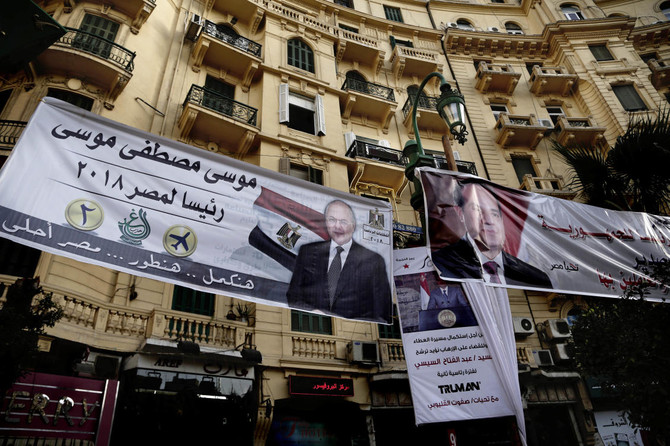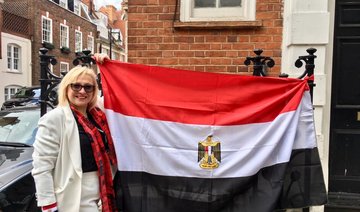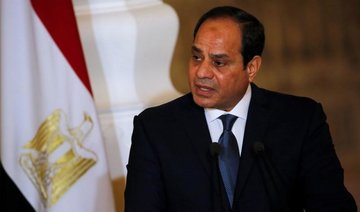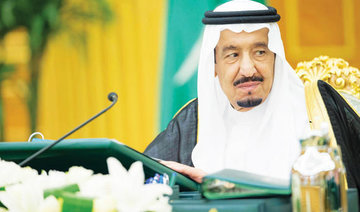CAIRO: The sole candidate running against Egyptian President Abdel-Fattah el-Sisi has had two showcase campaign rallies in downtown Cairo. The first was a disaster. No one showed up except a few campaign workers.
The second, on March 11, was a slight improvement: 30 people attended. They held banners and chanted slogans, though the chants weren’t exactly resounding victory cries for their candidate, an almost unknown politician named Moussa Mustafa Moussa.
“Whether Moussa wins or el-Sisi wins, either is our president!” they shouted.
There is no question the general-turned-president el-Sisi will win a second four-year term. But the March 26-28 election will likely be remembered as the event that signaled Egypt’s break with the little pretense it had left of democratic rule, seven years after a popular uprising toppled autocrat Hosni Mubarak in the name of democracy.
The election was preceded by a purge of would-be opposing candidates that was unprecedented even in comparison to Mubarak’s nearly 30-year rule. Authorities also clamped down on the media, even egging the public to report to the police anyone they feel is depicting the country in a bad light.
The question raised by many observers is why such extreme measures were taken to ensure a vote that el-Sisi would probably win anyway. El-Sisi seems convinced that a genuinely contested election could destabilize the country, allow his Islamist foes a back door into politics or interfere with his high-octane, single-handed drive to revive the battered economy.
El-Sisi was first elected in a 2014 landslide, riding on popularity after, as army chief, he led the military’s ouster of Islamist President Muhammad Mursi. He kept much of that popularity while ferociously cracking down on Islamists and secular dissenters.
He has insisted stability must take priority over freedoms as he carried out multiple, large-scale infrastructure projects and implemented painful austerity reforms. With those reforms, el-Sisi has succeeded in bringing some life back to the economy, though at the cost of inflation that has badly hurt many in the impoverished population. El-Sisi has also made a name for himself on the international stage as a champion against Islamic militancy.
After the election, el-Sisi and his supporters will very likely try to get rid of the constitution’s two term limit on the presidency, said Paul Salem, a senior Middle East expert from the Washington-based Middle East Institute.
“It might be the view of el-Sisi and his administration that this is needed for stability for economic and security reasons,” Salem told The Associated Press.
“My own personal view is that this buys stability for the short term but makes any transfer of power which has to happen sooner or later much more difficult,” Salem added.
Moussa, an ardent el-Sisi supporter, entered the race at the last minute to prevent the embarrassment of a one-candidate election. An extremely polite contestant, he has avoided sounding eager to win, never criticizes el-Sisi and in fact often praises him.
El-Sisi hasn’t bothered to campaign in person. Instead, the streets of Cairo and other cities have been swamped in a tidal wave of billboards, banners and posters with his image declaring: “He is the hope.”
A decent turnout is the one thing left to give the vote a measure of respectability. El-Sisi’s supporters have organized rallies urging the public to vote. Pro-government media proclaim that voting is a religious duty and failing to do so is “high treason.” Moussa’s supporters chanted at his rally that would-be boycotters are traitors and cowards.
In a speech Monday, el-Sisi urged everyone to vote, “whatever your political choices and opinions.” Laughing, he told the crowd, “I love you, go out and vote.”
Imad Hussein, the pro-el-Sisi editor of Al-Shorouk newspaper, criticized the handling of the election, not because the field of candidates was engineered but because it wasn’t done smoothly.
“We, of course, hoped to have a genuinely contested election,” he wrote last month. “But since we don’t have that, the government was supposed to at least prepare the stage to make it look democratic.”
The methodical elimination of opponents suggested el-Sisi felt a vulnerability — particularly to a candidate rooted in the military who could exploit possible cracks in his popularity, whether over pain from economic reforms, resentment over crackdowns or frustration over continued militant violence.
Several candidates dropped out, citing intimidation and harassment. But the harshest treatment was dealt out to two former generals: former military chief of staff Maj. Gen. Sami Annan and former air force general Ahmed Shafiq.
The candidacy of Annan “would have created a conflict that would impact on the ‘holy’ unity of the armed forces and push into the open files that can only remain secret,” analyst Abdel-Azeem Hamad wrote in a Feb. 22 column. Annan was the second-highest figure in the military’s supreme council that ruled Egypt for more than a year after Mubarak’s fall.
The 70-year-old Annan was an unquestioned member of the “deep state,” ensuring the military, police and other key institutions would not oppose his presidency, one of his top campaign aides, Hisham Genena, said in an interview last month.
“This blend of civilians and military men caused the regime to panic,” he said, alluding to Annan’s choice of him and a left-wing university professor as his top aides.
Annan struck a progressive tone in his short-lived candidacy. In a January video announcing his run, he lamented encroachments on freedoms and Egyptians’ suffering under el-Sisi’s economic reforms, and he called on the military to remain neutral in the voting.
Over the next three days, top military brass — including Egypt’s former military ruler, Field Marshal Mohammed Tantawi — tried to dissuade Annan from running, Genena said.
Annan brushed them off. Finally, authorities moved: on Jan. 23, he was grabbed from his car by masked men on a Cairo highway.
He has been detained ever since at a military prison, facing charges of incitement against the military, forgery and failing to secure clearance from the military to run for president.
Senior security officials said Annan had been under surveillance for months and was directly advised not to run, to maintain the military’s image as united without rival loyalties.
“He was fully aware of the consequences that awaited him ... The warnings were crystal clear,” said one of the officials, who spoke on condition of anonymity because they were not authorized to brief the media.
As he went to file an appeal against Annan’s arrest, Genena was beaten up by thugs his lawyers contend were sent by the police. Genena was later arrested after he claimed in a TV interview that Annan had documents incriminating Egypt’s leadership.
Annan is now under pressure to accept house arrest and silence in exchange for the dropping of all charges, according to a person with first-hand knowledge of the case. So far he has refused, but “they are bringing up all sorts of allegations” to push him into it, said the person, who spoke to the AP on condition of anonymity for the same reason as the security officials.
In the case of Shafiq, authorities were likely worried not just by his military credentials. Mubarak’s last prime minister, Shafiq ran in the 2012 presidential elections, seen as Egypt’s freest vote, finishing a close second to Mursi.
Shafiq lived in the United Arab Emirates since that election.
He announced his intention to run again in a Nov. 29 video. The Emiratis, close allies of el-Sisi, promptly arrested him and deported him to Egypt. At Cairo’s airport, he was whisked away by security agents, interrogated and confined under guard at a hotel, his phone confiscated, the security officials said.
Over the next days, senior security officials pressed him to drop out of the race, according to the officials. Pro-government media launched a high-intensity campaign to discredit him, threatening that past corruption cases against him would be revived and hinting at exposure of alleged sexual indiscretions.
Shafiq buckled, announcing his withdrawal on Jan. 7. He has not been seen since — effectively under house arrest, the officials said.
Annan and Shafiq posed particular problems for el-Sisi. They would have offered safe bets for voters seeking change but wary of parting company with the military, which many Egyptians still respect as a protector of stability and which produced all but two of Egypt’s presidents since the dawn of the republic in the 1950s.
But more worrisome, the tumultuous events of recent weeks fueled speculation about possible fissures within the military, which prides itself on iron-clad unity and secrecy.
It is not known whether Annan or Shafiq’s challenges to el-Sisi had any support among senior officers. But other developments have also raised question marks, such as unexplained dismissals in past months of the military’s chief of staff and the head of the General Intelligence Directorate, Egypt’s version of the CIA, who also hails from the military.
Government-controlled media have briefly mentioned conflicts among security and intelligence agencies, which are traditionally headed by men of military background, and there have been unconfirmed reports of top generals being quietly sidelined.
Further fueling speculation, el-Sisi in a recent speech angrily lashed out at unspecified opponents. “By God, the price of Egypt’s stability and security is my life and the life of the army,” he warned, directing an intense gaze at Defense Minister Sidki Sobhi, seated to his left. “I am not a politician who just talks,” he added.
Michael W. Hanna, an Egypt expert from New York’s Century Foundation, believes el-Sisi’s fury was chiefly directed at rivals inside the military.
“The regime is super sensitive,” he said, “but it may also be facing internal tensions and rivalries that are seeping out into the public domain.”
In Egypt election, El-Sisi imposes stability over democracy
In Egypt election, El-Sisi imposes stability over democracy

Iraqi foreign minister calls for emergency meeting of Arab counterparts next week

- Its aim would be to coordinate Arab positions on the escalating military confrontation between Israel and Iran
- Fuad Hussein suggests it take place during the Organisation of Islamic Cooperation’s Council of Foreign Ministers session that begins in Istanbul on Saturday
LONDON: Iraq’s foreign minister, Fuad Hussein, on Wednesday called for an emergency meeting of his Arab counterparts to discuss the conflict between Israel and Iran, which he said poses destabilizing risks to the wider Middle East.
He suggested it take place on the sidelines of the 51st session of the Organisation of Islamic Cooperation’s Council of Foreign Ministers, which is due to begin in Istanbul on Saturday. The aim of the emergency meeting would be to coordinate Arab positions on the escalation of the military confrontation between Israel and Iran, who have been exchanging attacks since Friday.
Also on Wednesday, Hussein called his Egyptian counterpart, Badr Abdelatty, to discuss the conflict and its repercussions for the security and stability of the region, officials said. Iraq currently chairs the Arab League, which held its most recent summit in Baghdad in May. Egypt hosts the League’s headquarters in Cairo.
Iran-Israel war fears spark fuel shortages in West Bank

- “Fearing potential supply disruptions or further escalation, citizens across the West Bank have begun stockpiling fuel,” said Abu Al-Rob
- In the northern West Bank city of Nablus, dozens of drivers waited in line for fuel
RAMALLAH, Palestinian Territories: Fears over the war between Israel and Iran have led to fuel shortages in the occupied West Bank, the Palestinian Authority told AFP Wednesday, as drivers queued in long lines to buy fuel.
“Fearing potential supply disruptions or further escalation, citizens across the West Bank have begun stockpiling fuel, putting additional pressure on an already strained market,” said Mohammad Abu Al-Rob, director of the PA’s communications center.
After decades of enmity and a prolonged shadow war, Israel on Friday launched a massive bombing campaign that prompted Iran to respond with missiles and drones.
The PA official said there has also been “a noticeable decline in the number of fuel tankers arriving from Israel, some of which have been redirected for use by the Israeli occupation army.”
In the northern West Bank city of Nablus, dozens of drivers waited in line for fuel.
Mohammad Ayoub, a resident of Nablus who had been waiting in line for two hours, said he hoped to finally purchase fuel after several failed attempts.
“I came yesterday at about 11:00 p.m. and found the gas stations closed. I also came early in the morning and the situation was the same.”
Ahmad Samaana, a truck driver from Nablus, complained of limits placed on fuel purchases.
“Large trucks, like the one I have, need about 500 liters, but when we enter the station, the worker at the station tells me that he allows filling up with a value of 500 shekels, which is less than 100 liters of diesel,” he told AFP.
“This is not enough for a truck.”
Abu Al-Rob noted that “the (fuel) supply chain remains entirely subject to Israel’s will and control,” as the country controls all entry points into the West Bank, which it has occupied since 1967.
He relayed the Ramallah-based Palestinian Authority’s call “to safeguard the flow of essential supplies — particularly fuel for hospitals, bakeries, and other critical sectors” should the situation worsen.
Israel to resume natural gas exports when military deems it’s safe, energy minister says

- Cohen said he has been in contact with Egypt and Jordan about the cut in supplies.
- “I don’t want to use our strategic storage, so therefore, I needed to cut exports”
TEL AVIV: Israel will resume its natural gas exports when the country’s military believes it would be safe to do so, Israel’s Energy Minister Eli Cohen said on Wednesday, as an air battle between Israel and Iran entered its sixth day.
Two of Israel’s three gas fields — Chevron-operated Leviathan and Energean’s Karish — off its Mediterranean coast that provide the bulk of exports to Egypt and Jordan, have been shut since June 13 amid the conflict between Israel and Iran.
That leaves in operation only the older Tamar field, used mainly for domestic supplies.
Cohen said he has been in contact with Egypt and Jordan about the cut in supplies.
“They can see that we are in a war. I don’t want to use our strategic storage, so therefore, I needed to cut exports,” Cohen told Reuters after a news briefing.
“I hope I will be able to use another rig as soon as possible and use it for the supply of gas (exports). For me, the most important thing is (supplying) Israel,” he said, alluding to fueling needs during the conflict with Iran.
It wasn’t clear when another gas field will be reopened, Cohen said, noting: “We are working with them [the military], the Navy, and right now their recommendation is that one (field) will continue to work and two will be shut down.”
Israeli gas accounts for about 15-20 percent of Egypt’s consumption, data from the Joint Organizations Data Initiative (JODI) shows. The disruption to Israel’s gas supply led Egyptian fertilizer producers to halt operations on Friday.
Israel launched the air war on Iran on Friday after concluding the latter was on the verge of developing a nuclear weapon. Iran maintains its nuclear program is purely for civilian purposes.
OTHER ENERGY SOURCES
Israel’s energy sector, Cohen said, was operating normally, with no shortages expected since the country also maintains reserves in coal, diesel and renewable energy.
Israel’s Oil Refineries in Haifa was hit by an Iranian missile this week, which killed three people and halted operations.
Cohen said he hoped the facility would resume operations within a month, though a second refinery in the south remains open.
Since Friday, the percentage of renewable, or solar, energy used in electricity production has more than doubled to some 40 percent, Cohen said.
There was also some damage to wastewater treatment facilities and pipelines from Iranian air strikes.
Cohen acknowledged that victory against Iran could take weeks but Israel’s energy demands could be met.
“Although the Iranians struck some of our plants, we have very strong energy facilities that can supply all the energy demands for Israeli citizens and the army, in fuel, gas, electricity and water.”
Iranian Ambassador in Tokyo hails Saudi and Arab support

- Ambassador Seadat recognized the substantial support from Crown Prince Mohammed bin Salman
- “We will always remember the kindness shown to us by our brothers in Saudi Arabia,” he told Arab News Japan
TOKYO: Iranian Ambassador to Japan, Peiman Seadat, expressed his gratitude for the unified support of Saudi Arabia and other Arab and Muslim countries in their collective effort against the aggression of the Israeli war machine.
He stated that this unity among Arab and Muslim nations is a testament to the strength of regional cooperation.
In an exclusive interview with Arab News Japan on Wednesday, the Ambassador highlighted that Arab and Muslim countries recognize the seriousness of the aggression by the Israeli regime and the threat it poses to the entire region.
Ambassador Seadat recognized the substantial support from Crown Prince Mohammed bin Salman and Foreign Minister Prince Farhan.
“We are deeply grateful for the compassionate assistance provided by the Crown Prince to approximately 80,000 Iranian pilgrims who have been stranded in Saudi Arabia. His Highness personally assured us that these pilgrims are being welcomed as guests of the Kingdom. We will always remember the kindness shown to us by our brothers in Saudi Arabia.”
The Iranian Ambassador, Seadat, also highlighted the support to Iran by Egypt, Qatar, the United Arab Emirates, and Oman, among others. He also expressed gratitude to the Secretary-General of the Gulf Cooperation Council, for his clear condemnation of Israel’s aggressive actions against Iran.
Gaza Humanitarian Foundation initiative ‘outrageous’: UN probe chief

- GHF began operations on May 26 after Israel completely cut off supplies into Gaza for more than two months, sparking warnings of mass famine
- UN and major aid groups have refused to cooperate with the foundation over concerns it was designed to cater to Israeli military objectives
GENEVA: The use of the US and Israeli-backed Gaza Humanitarian Foundation to distribute food in the Palestinian territory is “outrageous,” the head of a UN inquiry said Wednesday.
Navi Pillay, who chairs the UN’s Independent International Commission of Inquiry on Israel and the Palestinian territories, joined a growing chorus of criticism of the GHF’s operations, and cited its US links.
“In every war, the siege and starvation surely leads to death,” the former UN rights chief told journalists.
“But this initiative of what’s called a foundation, a private foundation, to supply food, is what I see as outrageous, because it involves the United States itself, the government, and it turns out, as we watch daily, that people who go to those centers are being killed as they seek food.”
An officially private effort with opaque funding, GHF began operations on May 26 after Israel completely cut off supplies into Gaza for more than two months, sparking warnings of mass famine.
The United Nations and major aid groups have refused to cooperate with the foundation over concerns it was designed to cater to Israeli military objectives.
Dozens of Palestinians have been killed while trying to reach GHF distribution points.
Pillay said the commission would “have to look into... the policy purpose and how it’s being effected.
“We have to spell out what is the motive of, right now, the killing of people who are coming for humanitarian aid from this so-called foundation — and that lives are being lost just in trying to secure food for their children.”
Unprecedented in its open-ended scope, the three-person Commission of Inquiry was established by the UN Human Rights Council in May 2021 to investigate alleged violations of international humanitarian and human rights law in Israel and the Palestinian territories.
South African former High Court judge Pillay, 83, served as a judge on the International Criminal Court and presided over the International Criminal Tribunal for Rwanda.
On Tuesday she presented the commission’s latest report to the Human Rights Council.
It said Israel had attacked Gaza’s schools, religious and cultural sites as part of a “widespread and systematic” assault on the civilian population, in which Israeli forces have committed “war crimes” and “the crime against humanity of extermination.”
Israel does not cooperate with the investigation and has long accused it of “systematic anti-Israel discrimination.”






















